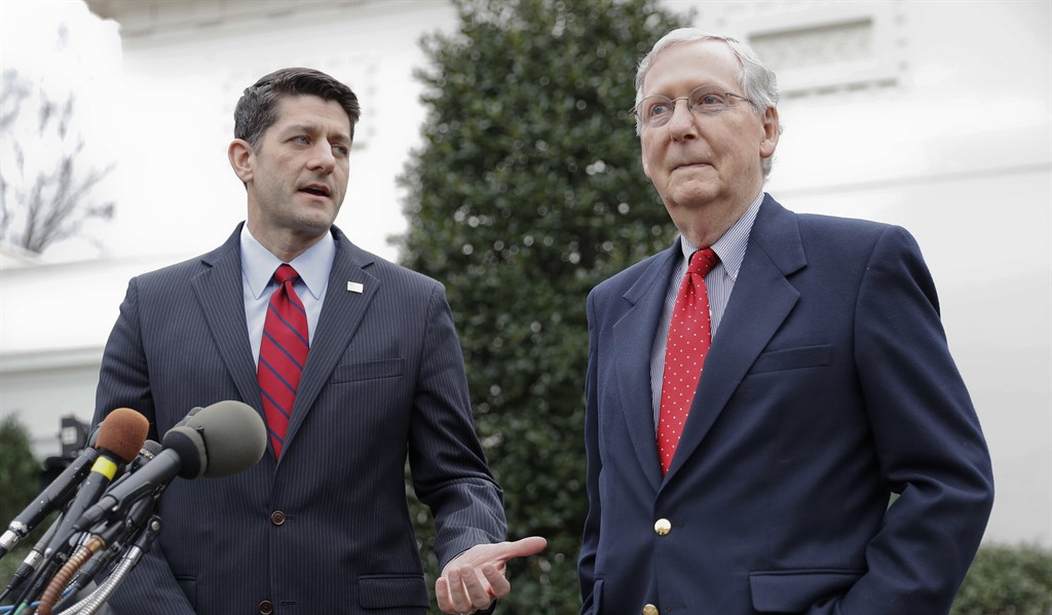Is this summer posturing, or a genuine effort at forcing Congress to stay at work? Thanks to the difficulties that Republicans on Capitol Hill have had in moving on their two biggest legislative goals — ObamaCare repeal and tax reform — the window for progress has grown tight, thanks to the traditional August recess. Several Republicans in both chambers are calling on House Speaker Paul Ryan and Senate Majority Leader Mitch McConnell to cancel the recess, opening up time for both these projects and budget negotiations for the September 30 deadline. Earlier today, Rep. Ron DeSantis re-upped the demand on Twitter:
The American people deserve the reform that we promised. I’ve sent a letter urging @SpeakerRyan to keep Congress in session during August. pic.twitter.com/M1xOxTuijY
— Ron DeSantis (@GovRonDeSantis) July 6, 2017
As the graphic shows, DeSantis isn’t alone in the House on the demand to work through the recess. The other signatories are members of the Freedom Caucus, the conservatives who gave Ryan a tough time for months on ObamaCare repeal. Maybe the prospect of spending August with them would prompt Ryan to think twice about the proposal, but it’s not just Republicans in the lower chamber making the demand. Last week, several members of the Senate Republican Caucus called on Mitch McConnell to keep the doors open in August, citing the lack of legislative time to work on a number of priorities:
Sen. David Perdue of Georgia led a letter Friday to Senate Majority Leader Mitch McConnell, signed by nine other GOP senators, saying that there is simply too much unfinished business to take the traditional extended break in August.
“We must complete the first phase of Obamacare repeal and replace. Next, we have to pass a budget that serves as a reconciliation vehicle for reforming our outdated tax code. Before September 30th, we must agree on an appropriation that responsibly funds the government. Also, we must deal with our debt limit before that approximate date,” the 10 senators wrote to the Kentucky Republican. “If we successfully navigate those priorities, we can finally get to our once in a generation opportunity on tax reform.”
Senate GOP leaders and a number of senators up for re-election in 2018 are unlikely to want to spend additional time at the Capitol building, but Perdue planned to discuss the legislative calendar and the call to curtail the August recess during a meeting with Trump on Friday at the White House, a Senate aide said.
So far, there hasn’t been much progress on ObamaCare, and certainly not enough to suggest that the GOP can succeed on its agenda with the short amount of time remaining. Sen. Jerry Moran told his Kansas constituents today that there is “not significant consensus on what the end result ought to be,” which might come as news to Republican voters who assumed that repealing ObamaCare was the significant consensus. Moran called for a robust floor debate to find a 60-vote consensus on the direction for health-care reform, which might take a whole year of Augusts to accomplish.
One has to wonder why Congress is leaving for August anyway. The short answer: It’s the law, sort of. It goes back to the Legislative Reform Act of 1970, which codified the recess into law as a way to ensure that members of Congress could get back to their constituents. Ryan and McConnell could override that, although it might take a majority vote in both chambers; it might be amusing to see whether anyone would publicly vote for a five-week vacation this year.
As I write in my column at The Week, the better question is whether we should eliminate the recess altogether, especially given its timing:
Few members of either chamber fully move to Washington any longer, and travel home regularly over the long weekends of the congressional schedule. In election years, House and Senate incumbents need to campaign at home, but even then incumbents have such overwhelming advantages over challengers that the carve-out is difficult to justify. In off years, there are few such pressures. Members of Congress have become increasingly reluctant to hold town-hall meetings with constituents, precisely because of blowback from both parties’ efforts to reform health care, so increasingly there is no constituent-oriented reason for the break.
There seems to be little reason for the August recess except as an escape, and the timing of it is particularly questionable. Every year, Congress has to pass a budget, an enormously complicated set of negotiations between 535 elected officials on Capitol Hill and the president at the other end of Pennsylvania Avenue. Does it make sense to have a five-week gap in that process within a month of the deadline?
The argument for a postponement just this year to resolve the health-care reform debate seems somewhat weaker. Republicans had seven years to put together a plan to repeal and replace ObamaCare. Counting from Trump’s surprise win in November, the two GOP caucuses have had eight months to work out the kinks. At this point, a deadline might serve better than an extension.
Still, the demand to cancel the August recess should get serious debate in both chambers in the next few weeks. In these populist times, voters want Congress to put their priorities ahead of members’ need for relaxation or campaigning, and most of them don’t get five weeks of vacation all year, let alone all at once. Congress should work at least as hard as the constituents that send them to Washington. If they want time off, let them earn it by getting their jobs done more efficiently and effectively.
Perhaps Congress could take this up now … or after they return from their ten-day recess for Independence Day next week.








Join the conversation as a VIP Member